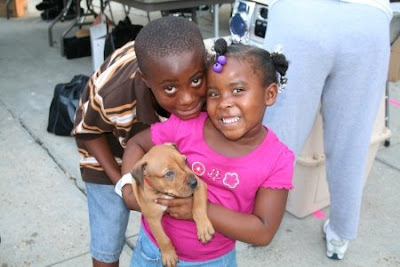Thursday, September 25, 2008
One New Orleans shelter worker speaks out
People were scattered into shelters without computers, cars, and in many cases, cash. Finding their pets was next to impossible. As the months rolled by, rescued animals were displaced, traveling to more than 1,000 shelters across the country, most without identification. Even those with collars weren’t necessarily tracked back to home. The numbers only led to flooded houses with no power, water or working telephones.
People in cities around the United States and Canada lined up to adopt Katrina pets, who were considered lost orphans of the storm. But in most cases, they were loved family members that their guardians hadn’t forgotten. Months later, many wanted their animals back. Their new owners were reluctant to part with pets they had grown attached to. Lawsuits were launched, and people argued their emotional rights to claim their property.
For Shelly Patton, webmaster and building manager of Louisiana SPCA, reunions witnessed after Katrina were bittersweet, in contrast to the reunions that occurred after pets were allowed to accompany their people when hurricane Gustav rolled into the city. Patton sums it up best.
“Katrina was surrounded by such loss,” Patton says. “Reunions were few and far between in relation to how many animals were saved. The reunions with Katrina were often counterbalanced – the foster's sorrow of giving the pet back by the owner's joy of reuniting. For me the whole experience with Katrina reunions was clouded by the massive loss. I couldn't seem to just enjoy the moment knowing that for each one reunited, there were hundreds still looking, hundreds who would never find. Gustav reunions were different. Owner after owner walked through the shelter doors to reclaim their pet. After being separated from their people, the animals were stressed. The owners were stressed after the ordeal they had gone through with their own evacuation. It was exciting to see the two lock eyes and realize they were together again. The visible difference in both their demeanors was in such stark contrast to the moments before. It was awesome! It was love reunited. It was the way it should be. It was the way I wish Katrina had been.”
Sunday, September 21, 2008
What about the humans?
We’ve finally reached a point in history when it’s dawning on us that the extensive damage we’re inflicting on our environment will lead to our eventual demise if we don’t reverse the course we’re headed on. Just like the air, trees and streams, the animals are an integral part of our environment.
Besides these arguments, you only need to examine the roles played by animals in our society to recognize their value. Dogs patrol our borders and partner with police officers to take down criminals. They lead the blind, direct the deaf, and sit quietly while children with speech impediments read to them. That’s how golf great Tiger Woods learned to stop stuttering. Cats working at nursing homes are notorious for landing on the bed of the next resident who’s going to die, camping out for days to usher them into the next life. Ninety-five percent of these people won’t receive one human visitor during their stay there. Prisoners learn compassion by participating in programs that teach them to groom shelter animals. Rats are saving soldiers’ lives in Iraq by sniffing out roadside bombs. The list of animals’ contributions towards humanity is endless and grows every day.
At some point, if we’re going to ask animals to serve our needs, we need to return the favour, or the balance is all out of whack.
When someone asks me “What about the humans?” I’ve got a few choice retorts that never fail to make an impression. Here’s one example. If you were lost in the woods, would you rather have your human family members sniff you out, or a German Shepherd? I think the answer is obvious. And if there are times that you’d rather put your life in the hands of an animal than a human being, don’t we owe it to them to give something back?
Pets are family, too

Politicians and government officials, take heed – if you don’t think animals are important enough to be included in your region’s evacuation plan, you are dead wrong. And some of your citizens will sacrifice their lives to prove it.
The mayhem that occurred when hurricane Katrina made landfall in New Orleans was a stark example of the bond people share with their pets. When I travelled to the city to rescue animals in the weeks that followed, I encountered evidence of this devotion firsthand.
At one destroyed house I happened upon, I found three frightened, disoriented dogs hiding under a woodpile. With a neighbor’s help, I managed to reach the dogs’ owner by cellular phone. The man explained that he had stayed with his dogs on the roof until a helicopter finally rescued him as the floodwaters rose to a dangerous level. He had already refused help for himself many times, despite the knowledge that he might die with his dogs. Finally, just in time, he made the heart-wrenching decision to save his own life.
When I told him that I’d found and fed three of his dogs, he dissolved into tears of mingled emotion: joy for the three that were alive, and grief for the one who had vanished.
A logistical argument debating the value of human life versus animal rights is irrelevant to those who receive creature comforts from their animals. Perhaps they suffer from social anxiety, loneliness, or lack of faith in people. Maybe they are shut-ins, or dependent on service dogs because they are blind or deaf. Or they may simply feel a moral responsibility not to leave their family’s animals to die alone.
As New Orleans works to recover from hurricane Gustav, happy reunions are still occurring at the Louisiana SPCA in Algiers. For the past couple of weeks, staff saw hundreds of people come and pick up their pets following a grand-scale evacuation that included the animals, a historical first. It wasn’t just the pet guardians that were touched to have their animals back in their care, Louisiana SPCA’s Shelly Patton said today.
“There were many times during the reunions that the staff were reduced to tears,” said Patton, the shelter’s webmaster and facility manager. “Not only because the people were happy to see the animals – their faces just lit up – but also because the animals were so happy to see the people.”
Thursday, September 18, 2008
Green Cross gives rescuers a mental Band-Aid
Late last month, I felt privileged to be invited to attend a course on trauma and compassion fatigue for Everett’s emergency responders. Police, firefighters, ambulance attendants, mental health workers and animal rescuers sat together to learn how to defuse and debrief people responding to assist at the scenes of unspeakable horror.
We weren’t trained to be therapists. Instead, we learned psychological first aid. Conducted by the Green Cross Academy, the two-day workshop, which earned me certification as a field traumatologist, was dynamic and practical, teaching attendees how to bring calm to people shook up by shocking images they’ve witnessed.
Mary Schoenfeldt, a public education coordinator for Everett Emergency Management and Green Cross’ international board president, shared the stage with Dr. Dan Casey, a Green Cross trainer and former wild land fire fighter, who flew in to Washington State from Minnesota for the seminar. The pair generously shared their knowledge and field experience with participants. Interactive presentations, slide shows and role-playing in small groups gave us a tool box to take into a high-stress disaster situation.
Green Cross has provided support beams to the animal rescue world in the past, such as their deployment to the Lamar Dixon temporary sheltering facility set up outside of New Orleans following hurricane Katrina, sponsored by the Humane Society of the United States. Mary Schoenfeldt was there to help. Rescuers from coast to coast are still buzzing about her team’s tireless work in the field. Green Cross counselors provided the mental patch that allowed animal rescuers to keep going back in for more despite enormous challenges.
We learned that a staggering number – 80 percent – of people exposed to a critical incident will have a reaction to it within three weeks. Through normalizing these reactions and vigilant self-care, such as proper rest, nutrition and down time, rescuers witnessing traumatic events can be brought back to stable mental health again much more quickly and painlessly.
In a field that’s shamefully underfunded by governments, mental health assistance isn’t always affordable or offered to animal rescuers despite the intense challenges they face. It’s comforting to know that with organizations like Green Cross out there, animal rescuers don’t have to suffer alone in silence.
Love thy neighbors and maybe they’ll help you rescue animals

I was surprised when several shelter managers told me they don’t hire job applicants who declare they love animals more than people. I’ve never been ashamed to count myself in this category.
After years of fighting it, I’m finally starting to realize that saving animals, whether you’re a shelter worker or an independent rescuer, is a hopeless mission destined to fail unless the help of others in the community is enlisted. For the rescuer, that means cultivating a healthy dose of patience and tolerance, plus an understanding of human beings and what inspires them to help you achieve positive results.
In my experience, these interactions with people are frequent and sometimes frustrating. But staying calm and keeping the mission in mind can provide you with rich rewards.
Wednesday, September 17, 2008
Working the rural low track with animal control
Animal control officers face many of the same dangers and responsibilities as other first responders, yet they aren’t afforded the same pay, respect, training or access to support services provided by governments to police, fire and ambulance attendants.
Yesterday I rode along with 28-year-old James Spain, an animal control officer for Whatcom Humane Society in northern Washington State.
He was patrolling a remote, two-mile area oddly called Paradise. It’s known for soaring crime rates, meth labs and Russian mobsters. Cellular and radio access is nearly non-existent.
As we cruised rural roads through lush, pristine forest, beams of sunshine reflected off garbage, abandoned half-finished houses and automobile chop shops.
A one-year career has brought to James a catalog of traumatic images more troubling than anything viewed by most people in a lifetime. He has rescued scores of animals in need in the line of duty, but the work takes its toll. Burning out after less than a year isn’t uncommon.
“You name it and I’ve seen it out there,” he says. “Every time you go to rescue an animal, and the animal doesn’t make it, you feel some guilt.”
Still, he isn’t deterred from his mission to save animals, and he intends to stay in the field.
“Until all the animals out there grow vocal cords and opposable thumbs and learn to speak English, they need someone to speak for them,” says James, only half joking.






